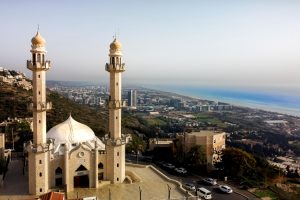
Egyptian-American comedian, Ramy Youssef, recently won his first Golden Globe Award earlier in the year for his show Ramy – a ‘comedy-drama’ series about an Arab Muslim family living in New Jersey. In a recently-resurfaced episode of the talk-show, ‘Late night with Seth Meyers’, Youssef was quizzed about his stand-up content, and in particular his decision to openly discuss his faith during skits. The host specifically questioned Youssef “on the idea of moderate Muslims, and the offence you take”, to which Youssef described his resentment of the phrase, explaining:
“[…] moderate Muslim makes it seem like if you were fully Muslim there would be a problem…it negates the fact that you could be fully practicing and fully involved and that would make you a good person”.
What is a moderate Muslim?
Ordinarily, the term ‘moderate’ refers to something ‘average in amount or intensity’, therefore it would not be illogical to assume that a ‘moderate Muslim’ is the ‘average, middle-of-the-road Muslim’. However, on more careful dissection of the origin and usage of this term, it quickly becomes apparent that this is not the case. When considering the religious practices of individuals of any faith, a spectrum of followers can be identified ranging from radical to moderate to liberal. ‘Radical’ followers of a faith often take up extreme practices and disfigure the teachings of a religion: a prime example of this distortion and extremism in radical Muslims would be viewing apostasy as a ‘crime’ punishable by death which is completely contrary to the teachings of the Holy Book of Islam, the Holy Qur’an:
‘There should be no compulsion in religion.’ (The Holy Qur’an, 2:257)
On the opposite end of the spectrum, ‘liberal’ followers of a religion hold a belief in God, but are open to the dismissal of traditional religious teachings and practices in the name of ‘progression’ and aligning with a changing society. In the case of Islam, ‘liberal’ often refers to followers of the faith who dilute the teachings of Islam to appeal to the Western model of society and integration, often appearing no different from their western peers. This may be in the act of ceasing to worship 5 times a day – a central tenet of the religion, or in only following Islamic principles at certain points in the year, such as the month of Ramadan. ‘Liberal’ Muslims may even be detached from the teachings of Islam completely and only call themselves Muslims in name. In fact, the Worldwide Head of the Ahmadiyya Muslim Community has explained how the Prophet of Islam (sa) foretold the divergence of Muslims from the true Islamic teachings:
‘In his prophecy, the Holy Prophet (sa) foretold of a time when the majority of Muslims would have forgotten the true teachings of Islam and their acts would not be in accordance with their religion.’ (Keynote Address, National Peace Symposium Canada, October 2016).
The Holy Prophet (sa) prophesied:
‘There will come a time upon the people when nothing will remain of Islam except its name only and nothing will remain of the Qur’an except its inscription. Their mosques will be splendidly furnished but destitute of guidance. Their divines will be the worst people under the heaven and strife will issue from and avert to them.’ – (Mishkatul Masabih, Kitabul Ilm)
Thus, though it appears that the ‘radical’ and ‘liberal’ Muslims would fall into this prophecy of the Prophet(sa) of Islam, what can be said of moderate Muslims? Although the name would indicate those ‘average’ Muslims who follow the true, central practices of Islam, the term can actually be synonymous with ‘liberal’ Muslim, especially due to its origin in Western discourse. Historically, the phrase ‘moderate Muslim’ arose from counterterrorist discourse, to separate radical, violent ‘Muslims’ from their moderate, level-headed counterparts. The term ‘moderate Muslim’ ran deeper than the face-value inference, instead implying that following Islam in moderation is good and too much of it is dangerous. In an age where such language only drives Islamophobia, these terms fuel the fire of xenophobia. A moderate Muslim becomes one who practices faith in a way that does not impinge on anyone else, versus the extremist who is intolerant of rights of other faiths, even to the point of the right to exist. Adding to the confusion as to whether a moderate Muslim is one who follows the ‘middle-road’, is the labelling of liberal practices, such as no longer donning the hijab – a requirement as part of the Islamic faith for Muslim women, as ‘moderate’. How can this be so, when it is instead actively going against Islamic teachings in the name of conforming to Western ideals of femininity and ‘integration’?
It seems the conflict in definitions is rooted in the conflict in interpretation of the true Islamic teachings. In fact, the true teachings of Islam emphasise moderation. The Holy Prophet (sa) of Islam once stated:
“Religion is very easy and whoever overburdens himself in his religion will not be able to continue in that way. So you should not be extremists, but try to be near to perfection and receive the good tidings that you will be rewarded; and gain strength by worshipping in the mornings, afternoons and during the last hours of the nights.” – (Bukhari, Kitabul Iman, Hadith 39)
Whilst the Prophet (sa) of Islam himself emphasised that ‘overburdening’ oneself in religion was not encouraged, he also stated to strive to be ‘near to perfection’, indicating that following the Islamic teachings as closely as possible was a means to following religion in a moderate, but pure-hearted manner. In this day and age, it appears that true ‘moderation’ in Islam, can only be achieved by following the original teachings of Islam. The Worldwide Head of the Ahmadiyya Muslim Community, Hazrat Mirza Masroor Ahmad (aba), further expanded on how the Ahmadiyya Muslim Community represents Islam in its true form, as prophecied by the Holy Prophet (sa):
‘And we, Ahmadi Muslims, believe the Founder of our Community to be the Promised Messiah and Mahdi who was sent according to the prophecies of the Holy Prophet of Islam (sa). During his life, the Promised Messiah (as) shined an eternal light upon Islam’s true teachings and informed the world of what Islam truly represents. Hence, the first point I wish to make clear is that the Ahmadiyya Muslim Community should not be considered a “liberal” or “reformist” sect of Islam. Rather, we are following the original teachings of Islam, as prescribed by the Holy Qur’an and the Holy Prophet Muhammad (sa).’
In highlighting that Islam’s true teachings are neither ‘liberal’ nor ‘reformist’, but moderate in their original form, His Holiness has made apparent that the Western notion of ‘moderate Muslim’ is based on a misrepresentation of Islam’s true essence by Western media and by the extreme ends of the ‘spectrum’ of Muslims themselves.
It is also interesting that this term of ‘moderate Muslim’is coined for the Muslim, by the non-Muslim, and a majority of Muslims themselves would not use such a term. Applying such a dichotomy to any religion is disingenuous and trivialises the faith of those billions of Muslims who fall across a massive and diverse spectrum where the aim of the majority is to reach the height of religious spirituality. Given that there are 72 sects in Islam with each presenting a slightly different interpretation of what they believe Islam to be, what then is the yardstick against which we measure the terms ‘moderate’ and ‘extremist’ when describing this large diverse population?
Islam: a model of moderation?
The best yardstick for measuring a ‘moderate Muslim’ then is to return to the original teachings and practices of a revealed faith. In the aforementioned prophecy of the Prophet (sa) of Islam regarding how ‘nothing of Islam’ but its ‘name’ would be left, glad tidings were also given that renaissance of the religion would also come by the Hand of God with the advent of the Messiah and Mahdi. Furthermore, the ideologies of a jihadof the sword would be put to rest by the revival of Islam by the Promised Messiah (as). The Promised Messiah(as) explains the purpose of his advent with the following words:
‘However, in this, the fourteenth century, Allah the Exalted sent me by way of divine appointment so that I may dispel the errors that have taken root within the Muslims internally and manifest the truth of Islam before the world.’ – (The Promised Messiah(as) ,Malfuzat-Volume 2, (Islam International Publications Ltd., 2019), 50.
The nature of Islamic teachings are intrinsicly moderate and compatible with the West. The true integration of Islam in a secular, Western society is explained by Hazrat Mirza Masroor Ahmad (aba):
‘Muslims are taught to show love, compassion and kindness to all of God’s Creation, especially to humanity, which Allah has deemed as the best of Creation. It is absolutely true that we, Ahmadi Muslims, are peace-loving and seek to build bridges of love and hope between different religions and different communities. However, this is not because we have deviated from Islam or modernised it in any shape or form. Rather, it is because we follow Islam’s authentic teachings.’
At a keynote address in Berlin, Germany (22ndOctober 2019) His Holiness also mentioned that there is no such ‘clash of civilizations’ between Islam and Europe:
‘In terms of the Ahmadiyya Muslim Community, we believe that under no circumstances does Islam permit the use of force or any type of coercion in the spread of faith. Why then is there a need to fear Islam? Why do people think that their civilisation or culture is at risk from Muslims?’
Countless examples of the moderate nature of Islamic teachings are demonstrated by none other than the Prophet (sa) of Islam himself who is the most ideal example for all Muslims to emulate. One example of this was narrated by his wife, Hazrat Aisha (ra), in which he described the importance of fulfiling the many obligations in a person’s life:
‘The Prophet (sa) called ‘Uthman bin Maz’un. When he came to him, he said: ‘Uthman, did you dislike my practice? He said: No, by Allah, but I seek your practice. He said: I sleep, I pray, I keep fast, I (sometimes) leave the fast, and I marry women. Fear Allah, ‘Uthman, your wife has a right over you, your guest has a right over you, your self has a right over you; you should keep fast and (sometimes) leave the fast, and pray and sleep.
(Sunan Abi Dawud, Kitab as-Salat, Hadith 1369)
Islam is the model for moderation. The life of the Holy Prophet (sa) is the perfect personification of those teachings. To be moderate is synonymous with being a Muslim who follows the true teachings of Islam in its most pristine and original form. As the Holy Prophet(sa) of Islam has reminded us in the following hadith :
‘The best of all matters is in the middle path’ – (Al-shaukani Fi Al-Fawa’id Al-Majmu’ah, Hadith 251)




Add Comment